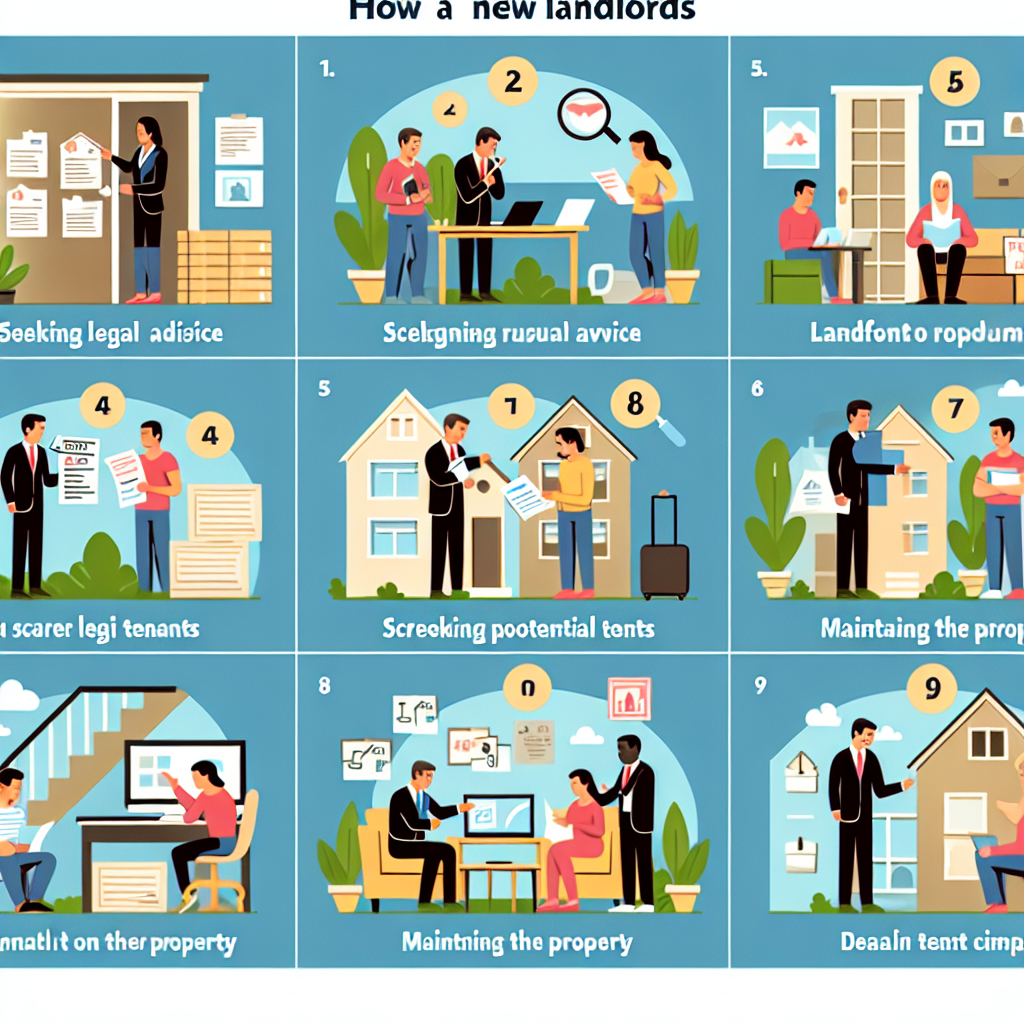-
Table of Contents
- New Landlord Guide: 9 Crucial Steps to Get Started
- 1. Understand Your Legal Obligations
- 2. Set a Competitive Rent Price
- 3. Prepare Your Property
- 4. Market Your Property Effectively
- 5. Screen Potential Tenants
- 6. Draft a Comprehensive Lease Agreement
- 7. Collect Rent and Security Deposits
- 8. Maintain Open Communication
- 9. Stay Organized and Keep Records
- Conclusion
New Landlord Guide: 9 Crucial Steps to Get Started

Becoming a landlord can be a rewarding venture, offering a steady stream of income and the potential for long-term financial growth. However, it also comes with its own set of challenges and responsibilities. Whether you’re renting out a single property or managing multiple units, it’s essential to be well-prepared. This guide outlines nine crucial steps to help new landlords get started on the right foot.
1. Understand Your Legal Obligations
Before you even think about listing your property, it’s crucial to understand the legal obligations that come with being a landlord. These can vary significantly depending on your location, so it’s essential to do your homework.
- Fair Housing Laws: Ensure you comply with federal, state, and local fair housing laws, which prohibit discrimination based on race, color, religion, sex, national origin, familial status, or disability.
- Lease Agreements: Draft a comprehensive lease agreement that outlines the terms and conditions of the rental. This should include rent amount, due dates, security deposit details, and maintenance responsibilities.
- Health and Safety Regulations: Make sure your property meets all health and safety standards, including fire safety, electrical systems, and structural integrity.
Consulting with a real estate attorney can provide you with a solid understanding of your legal responsibilities and help you avoid potential pitfalls.
2. Set a Competitive Rent Price
Setting the right rent price is crucial for attracting tenants and ensuring a steady income. Conducting a market analysis can help you determine a competitive rate.
- Research Comparable Properties: Look at similar properties in your area to see what they are charging for rent. Websites like Zillow, Rentometer, and local real estate listings can be valuable resources.
- Consider Your Expenses: Calculate your monthly expenses, including mortgage payments, property taxes, insurance, and maintenance costs. Ensure the rent covers these expenses while providing a reasonable profit margin.
- Adjust for Amenities: If your property offers unique amenities such as a pool, gym, or upgraded appliances, you may be able to charge a higher rent.
Setting a fair and competitive rent price can help you attract quality tenants and minimize vacancy periods.
3. Prepare Your Property
First impressions matter, and a well-prepared property can attract high-quality tenants. Here are some steps to get your property ready for the rental market:
- Clean Thoroughly: Ensure the property is spotless, including carpets, windows, and appliances. A clean property is more appealing to potential tenants.
- Make Necessary Repairs: Address any maintenance issues, such as leaky faucets, broken windows, or faulty electrical outlets. A well-maintained property signals to tenants that you are a responsible landlord.
- Enhance Curb Appeal: Simple improvements like landscaping, painting the front door, and adding outdoor lighting can make a significant difference in attracting tenants.
Investing time and effort into preparing your property can pay off in the form of higher rent and better tenants.
4. Market Your Property Effectively
Once your property is ready, it’s time to market it to potential tenants. Effective marketing can help you reach a larger audience and fill vacancies quickly.
- Online Listings: Post your property on popular rental websites like Zillow, Craigslist, and Apartments.com. Include high-quality photos and a detailed description of the property and its amenities.
- Social Media: Utilize social media platforms like Facebook, Instagram, and Twitter to promote your property. Join local community groups and real estate forums to reach potential tenants.
- Signage: Place a “For Rent” sign on the property to attract local interest. Ensure the sign is visible and includes contact information.
Effective marketing can help you find the right tenants quickly and reduce vacancy periods.
5. Screen Potential Tenants
Finding reliable tenants is crucial for a successful rental experience. Thorough tenant screening can help you avoid potential problems down the road.
- Background Checks: Conduct background checks to verify the tenant’s identity, criminal history, and rental history. Services like TransUnion SmartMove and MyRental can assist with this process.
- Credit Checks: Check the tenant’s credit score and financial history to ensure they can afford the rent. A good credit score indicates financial responsibility.
- References: Contact previous landlords and employers to get a sense of the tenant’s reliability and character.
Thorough screening can help you find responsible tenants who are likely to pay rent on time and take care of your property.
6. Draft a Comprehensive Lease Agreement
A well-drafted lease agreement is essential for protecting your rights as a landlord and setting clear expectations for your tenants.
- Include Essential Terms: Clearly outline the rent amount, due dates, security deposit details, and lease duration. Specify any penalties for late payments or lease violations.
- Maintenance Responsibilities: Define the responsibilities of both the landlord and tenant regarding property maintenance and repairs.
- Rules and Regulations: Include any rules regarding pets, smoking, noise levels, and property use. Ensure these rules comply with local laws and regulations.
Having a comprehensive lease agreement can help prevent misunderstandings and disputes with your tenants.
7. Collect Rent and Security Deposits
Establishing a reliable system for collecting rent and security deposits is crucial for maintaining a steady cash flow.
- Payment Methods: Offer multiple payment options, such as online payments, checks, or direct deposits. Online payment platforms like PayPal, Venmo, and Zelle can make the process more convenient for tenants.
- Security Deposits: Collect a security deposit to cover any potential damages or unpaid rent. Ensure the deposit amount complies with local laws and regulations.
- Receipts and Records: Provide receipts for all payments and maintain accurate records of rent payments and security deposits.
Implementing a reliable rent collection system can help you manage your finances more effectively and reduce the risk of late or missed payments.
8. Maintain Open Communication
Maintaining open and transparent communication with your tenants is essential for building a positive landlord-tenant relationship.
- Be Responsive: Respond promptly to tenant inquiries and maintenance requests. Timely communication can help resolve issues quickly and prevent them from escalating.
- Regular Check-Ins: Schedule regular check-ins with your tenants to address any concerns and ensure the property is being well-maintained.
- Provide Updates: Keep tenants informed about any changes to the property, such as upcoming maintenance work or changes in policies.
Open communication can help build trust and foster a positive rental experience for both you and your tenants.
9. Stay Organized and Keep Records
Effective property management requires staying organized and keeping detailed records of all transactions and communications.
- Document Everything: Keep records of all lease agreements, rent payments, maintenance requests, and communications with tenants. This documentation can be invaluable in case of disputes or legal issues.
- Use Property Management Software: Consider using property management software like Buildium, AppFolio, or Rentec Direct to streamline your operations and keep track of important information.
- Stay Updated: Keep up-to-date with changes in local laws and regulations that may affect your responsibilities as a landlord.
Staying organized and maintaining accurate records can help you manage your properties more efficiently and reduce the risk of legal issues.
Conclusion
Becoming a successful landlord requires careful planning, attention to detail, and a commitment to providing a positive rental experience for your tenants. By following these nine crucial steps, you can set yourself up for success and enjoy the benefits of being a landlord. Remember to:
- Understand your legal obligations
- Set a competitive rent price
- Prepare your property
- Market your property effectively
- Screen potential tenants
- Draft a comprehensive lease agreement
- Collect rent and security deposits
- Maintain open communication
- Stay organized and keep records
By taking these steps, you can attract quality tenants, minimize vacancies, and ensure a smooth and profitable rental experience. Good luck on your journey as a new landlord!








